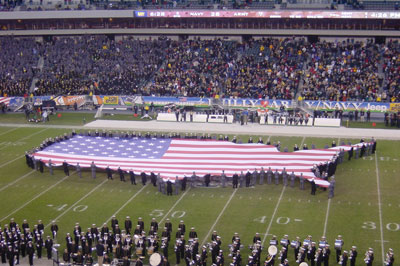All Nonfiction
- Bullying
- Books
- Academic
- Author Interviews
- Celebrity interviews
- College Articles
- College Essays
- Educator of the Year
- Heroes
- Interviews
- Memoir
- Personal Experience
- Sports
- Travel & Culture
All Opinions
- Bullying
- Current Events / Politics
- Discrimination
- Drugs / Alcohol / Smoking
- Entertainment / Celebrities
- Environment
- Love / Relationships
- Movies / Music / TV
- Pop Culture / Trends
- School / College
- Social Issues / Civics
- Spirituality / Religion
- Sports / Hobbies
All Hot Topics
- Bullying
- Community Service
- Environment
- Health
- Letters to the Editor
- Pride & Prejudice
- What Matters
- Back
Summer Guide
- Program Links
- Program Reviews
- Back
College Guide
- College Links
- College Reviews
- College Essays
- College Articles
- Back
Persuasive Devices in Patrick Henry's
In “Speech in the Virginia Convention,” patriot Patrick Henry uses restatement and parallelism to urge his audience to take a stand for liberty and fight for their independence. Throughout the speech, Henry utilizes restatement, a persuasive device that involves presenting the same idea in different ways throughout a literary work, to paint British King George III as a villain. The first example of Henry’s portrayal of the king as a villain is when he says, “We are apt to shut our eyes against a painful truth, and listen to the song of that siren, till she transforms us into beasts” (204). Henry alludes to Homer’s The Odyssey, comparing King George III to the epic poem’s deceptively appealing sirens. Henry is suggesting that just as the sirens lure sailors in with false promises, the king is misleading the colonies into thinking he is on their side. This comparison demonstrates the idea that the British king is the colonies’ antagonist, a concept that is restated in different ways throughout the speech. Another example of this is when Henry alludes to the Bible: “Suffer not yourselves to be betrayed with a kiss” (204). He is referring to the Biblical event when Judas kisses Jesus only to betray him shortly after. Henry warns that the king will do the same thing: indulge them with false promises only to turn on them when they fight for their rights. His restatement of the king being a villain is effective because he is drawing comparisons between the king and antagonists in stories the audience is already familiar with, which is conducive in persuading his audience to rebel against the king.
In addition to restatement, Henry uses parallelism, the deliberate repetition of grammatical structure, as a persuasive technique to convince his audience to join the fight against England. Henry uses parallelism as a way of stressing that the colonies have tried everything they possibly could to negotiate with England: “We have petitioned; we have remonstrated; we have supplicated…Our petitions have been slighted; our remonstrances have produced additional violence and insult; our supplications have been disregarded” (204). Henry is suggesting that the colonies have exhausted all their options; England has left them no choice but to go to war. By listing everything the colonies have done to avoid violence, Henry is emphasizing that he and the colonies are not taking war lightly. He is suggesting the necessity of going to war, which would appeal to logos, or the logical persuasive appeal. Another example of parallelism in this speech is Henry’s famous last line, “give me liberty, or give me death!” (206). The simplicity of this line is powerful. By placing these two options in parallel structure, Henry is, in a sense, giving them the same weight. He is saying liberty is just as important to him as life itself. Henry’s use of parallelism throughout the speech stresses not only the necessity of war but also the personal value he has placed upon it, therefore making it very persuasive for his audience.

Similar Articles
JOIN THE DISCUSSION
This article has 0 comments.
